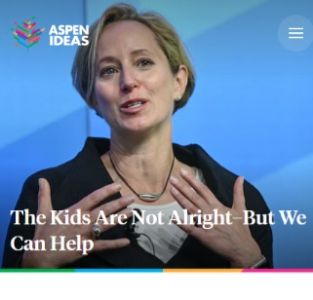No group is immune to mental health problems, especially among the youth, and especially in recent years. Every class, race and culture has shown a roughly 40% increase in depression between 2008 and 2019. In this video, the Aspen Institute presents a panel made up of Dr. Christine Moutier, chief medical officer at the American Foundation for Suicide Prevention, Dr. Lisa Damour, clinical psychologist and writer, and Dr. Rick Weissbourd, a Harvard child and family psychologist. The three discuss the roots of the mental health crisis, and some possible solutions.
Since 2007, there’s been an alarming rise in mental health issues among teenagers.
The youth suicide rate has risen every year since 2007, with the exception of 2019. Even the most privileged classes are losing children to suicide, as evidenced by the suicide clusters in Palo Alto, California, among children who’ve been raised with every advantage. Affluent communities may endow their kids with achievement pressure, low-income communities are facing generations of poverty and despair, and, more recently, kids feel traumatized by world events.
That said, the effects of depression are still unequally distributed. LGBTQIA+ kids suffer from a higher rate of mental health issues, and girls are two to three times more likely to be depressed than boys. Children of color are more likely to be punished than to receive help, contributing to poor mental health and the school-to-prison pipeline.
Several factors have contributed to worsening mental health, among them social media, societal trends and the COVID-19 pandemic.
During adolescence, young people have two primary tasks – one is to grow more independent, and the other is to spend ...
The Aspen Institute is an international nonprofit foundation that has provided seminars, conferences and policy initiatives since 1949, with the aim of contributing to the creation of “a free, just and equitable society.”









Comment on this summary